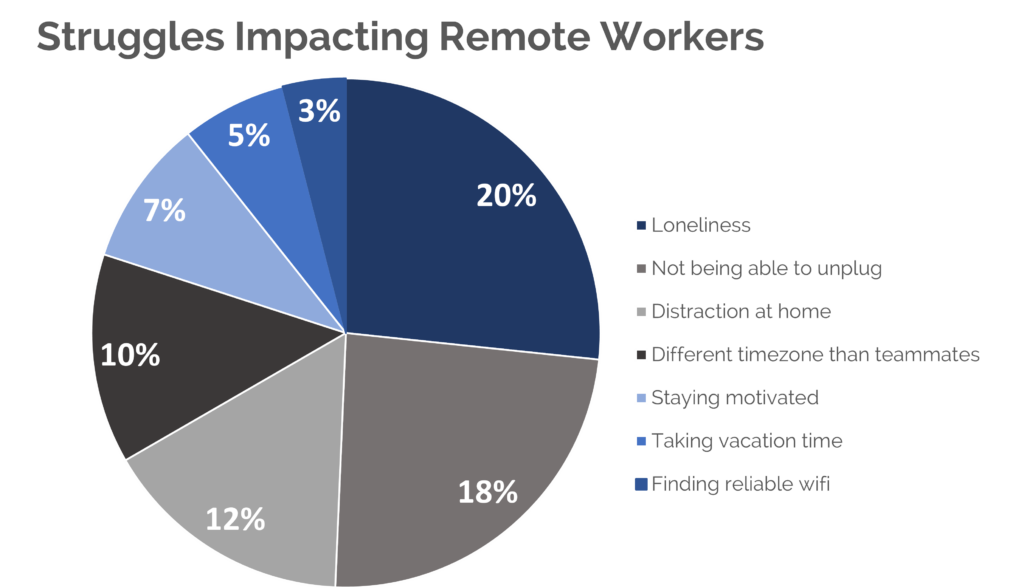Flexibility, lifestyle prioritization, location choice, and reduced commuting costs. These are a few of the many benefits that working remotely has proven to not only remote dedicated teams but also everyone in the world in recent months. Today’s stark reality, in any organization, is the degree of comfort with clocking in to your 9 am meeting with suitable work attire on top and your fluffy pyjamas underneath, hidden from your work colleagues’ gaze.
Joking aside, the traditional office, we once knew, established a company’s DNA. The traditional worker was previously motivated by the attractive workspaces, weekly/monthly food treats, and holiday bonuses, but this tide has turned.
Instead, current or prospective employees seek gratification in an inclusive team culture. Humans, no matter how poised they are as individuals, rely on others, especially in a software development industry where cohesion is essential for the creation and sustainability of technical projects.

The Pandemic has emphasized the need for organizations to adapt to their employee’s needs and the creation of systems, remotely, that maintain and supersede the traditional team culture. Leadership and learning are pivotal components to a software developer‘s progression and if that culture is not present within the company, things can become a hot mess.
So why is building team culture online so important for software companies?
The company’s ability to achieve its goals and productivity levels, as well as their employees’ satisfaction depends to a great extent on the company’s culture.
For those who can’t remember office life pre-2020, your best work probably included lots of collaboration with different individuals under the same roof. Maybe those software developers on the 5th floor who you regularly met in the communal kitchen during coffee breaks joined your major project to reduce that pressure with encouragement and communication? Maybe, that bug causing havoc to your application launch was fixed by the front end developer you would regularly play 5-a-side soccer with on the weekends?

In short, team culture is established through personal relations, whether it be in the communal kitchens, company football matches, or Friday Happy Hours. When working within an office setting, it’s much easier to acquire certain values and habits that are unique to your company. Real team culture is the acknowledgment of a common purpose, trust, and the ability to direct individual accomplishments towards organizational objectives.
The office has now been reduced to a remote lifestyle from our homes or temporary residence worldwide, thereby reducing the capacity to connect with our colleagues in person. Those cultural habits built over time in an office environment may have been useless, but in reflection, a culture built remotely across hundreds and thousands of network streams can continue with a solid routine and useful outlets.
But, I don’t feel like I’m part of my dedicated team or the conversation when working remotely!
With every positive comes a negative, and employees’ concerns are completely valid in this instance. The challenges for team leaders and the remote team varies from a lack of productivity and engagement levels. This results in accidentally excluding the intern out of the daily Zoom call or forgetting to CC the project manager in email trails, which is of course, destructive to a company’s culture.
According to the 2020 State of Remote Work report conducted by Buffer and AngelList, these were found to be the main struggles that affect remote workers since the beginning of the Pandemic.

- Collaboration and Communication (20%)
- Loneliness (20%)
- Not Being Able to unplug (18%)
- Distractions at home (12%)
- Being in a different timezone than teammates (10%)
- Staying motivated (7%)
- Taking vacation time (5%)
- Finding reliable WiFi (3%)
The lack of visual body language and cues in the digital world leads to miscommunication in a lot of instances within the team. Included in the struggles with communication/collaboration can lead to nonessential micromanagement from the team leader causing stress for the team and a violation of boundaries.
Loneliness can affect any teammate, at any time, when working remotely. Confinement at the same desk for long periods, with no other face to face interaction, can be detrimental to your teammate’s mental health. The addition of working in opposite time zones causes additional stress on deadlines and forces some teammates to clock in at unsociable periods in the day, thereby affecting sleep patterns.
Unplugging from office life while in your home or decompartmentalising your work life with your personal life under the same roof can be mind-boggling. With smartphones, people can’t escape the email notifications while enjoying Netflix and constantly feel like they need to respond to pointless emails on a Thursday night.
OK…..I understand the disadvantages now of working remotely but, what can I do to build my remote team’s culture?
If I told you that a great Team Culture can be created remotely in 5 steps would you apply it to your IT development team?
Here are 5 fantastic methods to kickstart your company’s culture online and get your employees excited about what they do!

1. Invite everyone to ‘Water Cooler’ meetups each week
The water cooler or kitchen is generally a spot in the office where you can decompress from the madness happening in your work area. This applies the same, but in a remote setting, where the team and other individuals from the company can meet up and chat informally. To make these digital meetups a favorite amongst the team are organizing games, topics, or quizzes beforehand to make sure a conversation about work doesn’t crop up to spoil the fun. Other sub meetings could include a virtual book club, a wellness group, or a pet group. Because who doesn’t like looking at cute dog videos all day?

2. Continuously Recognize Employees Contribution to the Cause
In an office, there is nowhere to hide! Well, the toilet can be a great escape from your deadlines and supervisor, if needs be. Working remotely can count for a lot of effort when juggling family and WiFi outages on a constant basis, but employers don’t witness this throughout the day. Leaders should connect with every team member and make them realize that their output has a significant impact on the success of their business unit, and thus their organization, in order to strengthen the team culture. Positive company culture comes with the desire for compliments and recognition, so if this is in place on a regular basis, production and job satisfaction will only rise, creating better outcomes for the whole team.

3. Prioritize Uninterrupted Work Cycles
Giving out all that recognition for Hard Work is legitimate when work has been completed with focus. Moving to a remote Team structure can leave a high expectation for continuous communication throughout the day, but take this with a pinch of salt when your UI Architect can’t concentrate with the streams of unnecessary emails and group chats chiming every minute. Yes, communication is the backbone of a successful Team Culture, but employees need stretches of time without interruption. Instead, initial communication can be an email or a post in the company blog outlining that extended times without contact will not be frowned upon. Moreover, those cultural changes don’t happen within a day. They need practice and repetition.

4. Reduce Virtual Distance
Virtual distance is a sense of psychological and emotional detachment that begins to grow little by little when most encounters and experiences are conveyed by screens on electronic devices. Some software companies have already developed this culture of togetherness when they have development teams scattered around the globe. Focusing on minimizing affinity distance, or the personal connection between team members is the greatest method for managers to drive team success. Switch to frequent video calls for most remote communication, which are better for developing rapport and creating empathy than emails or voice calls. Remind teammates that your virtual office door is always open, you don’t have to be a boss. Encourage colleagues to contact you on the phone or ask for help by displaying a supportive attitude.

5. Use Collaborative Tools to your Advantage
When a firm is now operating remotely, communication is critical to maintaining a healthy culture. Great collaboration platforms like Slack allow companies to virtualize in-office rituals while remaining connected across teams. It is the leadership’s job to sustain culture by encouraging employees to engage in virtual traditions.




